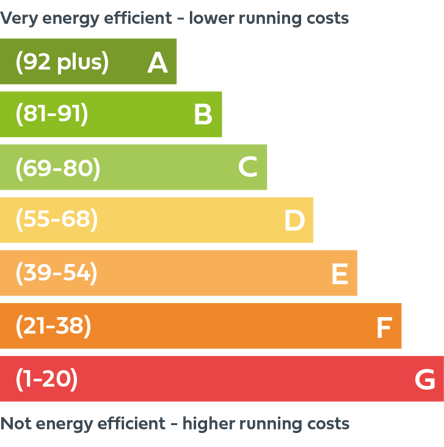EPCs: Where we are, where we're going and how to get ready
Although it’s not law yet, it seems almost certain that the English Government will press ahead with its plans for a minimum EPC rating of ‘C’ for all homes in England and Wales by 2035 as part of its commitment to net-zero emissions by 2050. This represents a big change for the industry — the current minimum standard is ‘E’, meaning that a large number of the UK’s 15 million homes will need substantial modification if they are to continue to be let and sold. Critics and surveys, however, have revealed a number of flaws in the plan, from a lack of engagement to insufficient funding incentives.
How do EPCs work?
An EPC provides a property with an energy efficiency rating from A (most efficient) to G (least efficient). It also contains information about a property’s energy use and typical energy costs and recommendations about how to reduce usage and save money.
In 2018, the English Government set a Minimum Energy Efficiency Standard (MEES) for Energy Performance Certificates for the first time since they became a requirement for building, selling or renting a home in 2007.
Under the Domestic Minimum Energy Efficiency Standard (MEES) Regulations, all properties in England and Wales must be rated ‘E’ or higher to be privately let. If a property does not meet the minimum ‘E’ standard, it cannot be let under a new tenancy agreement until the owner of the property brings it up to the minimum standard. On 1 April 2020, this rule was extended to cover existing tenancies so that no property could continue to be let until it met the minimum standards.
EPC ratings from A to G
How does the Government want to change EPCs?
Even before setting the MEES at ‘E’, the Government said in its Clean Growth Strategy for the UK in 2017 that it wished as many homes as possible (both rented and owned) to reach EPC Band C by 2035 where “practical, cost-effective and affordable.”
For the private rented sector, it set an aspirational target for all properties to reach EPC Band C by 2030, using a phased approach with new tenancies first, followed by all tenancies.
It followed through on this aspiration in September 2020 with the launch of its ‘Improving the energy performance of privately rented homes’ consultation. This sought feedback on the following proposals for the private rented sector:
- Raise the energy performance standard to EPC Band C
- Use a phased trajectory to improve new tenancies from 2025 and all tenancies from 2028
- Increase the maximum investment amount, resulting in an average per-property
- spend of £4,700 under a £10,000 cap
- Introduce a ‘fabric first’ approach to energy performance improvements
The Government has not yet released the results of its consultation, which closed in January 2021.
How have these proposals been received by the industry?
The idea of raising EPC standards has been discussed plenty in the media, with many, such as Jonathan Daines of lettingaproperty.com, questioning how viable the suggested targets are without having the right financial incentives. Daines cites a survey from Santander which found that 53% of homeowners could not afford to retrofit their home, while 77% of brokers would be highly supportive of grants for landlords to make energy efficiency improvements.
Industry body RICS (Royal Institution of Chartered Surveyors) believes that EPCs themselves should be updated to account for the multiple ways they are used. At their inception, EPCs were used only to benchmark the energy performance of buildings, but since then their usage has been expanded to influence energy improvement funding among other areas.
EPCs currently use fuel cost as their main measurement metric. RICS believes the EPC methodology should be revised to also measure environmental impact (carbon emissions) and primary energy.
Under the current methodology, switching from natural gas to electricity will provide a lower EPC rating because it means a rise in fuel costs. But this does not take into account that a property’s carbon usage will be reduced by moving away from gas, therefore making it better for the environment.
RICS says changing EPCs to measure a wider range of criteria will make them more accurate, ensuring homeowners and tenants are more engaged with their home’s EPC, increasing the likelihood of them making improvements of their own accord.
Research backs up RICS’ suggestion that there is a lack of engagement with EPCs from homeowners and tenants. A survey by MyGlazing found that 43 per cent of owners don’t know what their property’s EPC rating is, with almost one in five not even knowing why their property has an EPC rating. 45 per cent also did not know how to find their property’s EPC certificate.
One area where incentives are being developed is mortgages. Landlord Today reports that Skipton Building Society is offering landlords who have a mortgage account with them a free ‘Energy Performance Certificate Plus’ report for up to ten properties they own.
This report is intended to go a step further than a traditional EPC report, providing an idea of what a home’s potential EPC rating could be as well as a bespoke guide for how the landlord could achieve it and what benefits an improvement in rating could bring, including reductions in carbon emissions and energy bills.
What’s next for EPCs?
The research above suggests a high level of ignorance about Energy Performance Certificates and what they’re for. There’s also a gap in financial incentives for those wishing to retrofit, especially considering the maximum cap for how much the landlord or homeowner will be expected to pay for required improvements will be raised to £10,000.
In the meantime, watch this space for the Government’s response to its ‘Improving the energy performance of privately rented homes’ consultation.
Are your properties protected this winter? Unpredictable weather and freezing cold climates can cause all kinds of problems with houses. Give your tenants a copy of our handy guide and avoid costly repairs.
BLOG DISCLAIMER
This article is intended for information purposes only and does not constitute legal advice. If you have any questions related to issues in this article, we strongly advise contacting a legal professional.
These blog posts are the work of Fixflo and are licensed under a Creative Commons Attribution-ShareAlike 3.0 Unported License. In summary, you are welcome to re-publish any of these blog posts but are asked to attribute Fixflo with an appropriate link to www.fixflo.com. Access to this blog is allowed only subject to the acceptance of these terms.


